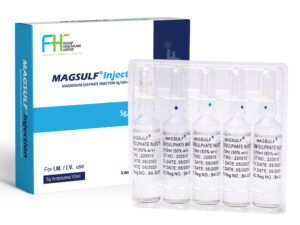
MAGSULF®
Magnesium sulphate injection 5g/10ml (50% w/v)
MAGSULF is magnesium sulphate 50% w/v solution for injection. It is a sterile solution containing magnesium sulphate (as heptahydrate). It contains water and may also contain a little amount of hydrochloric acid and/or sodium hydroxide. The product is available in 10ml ampoules in packs of 5 ampoules. It will be administered by a healthcare professional and may be diluted first.
INDICATION
MAGSULF is prescribed for:
- Increasing the amount of magnesium in the body in conditions where, because of variety of causes, the blood level of magnesium is below normal.
- Prevention of further fits(seizures) occurring because of very high blood pressure in pregnancy(eclampsia).
Before you start a treatment with MAGSULF
Magnesium sulphate injection should not be used if:
- You are sensitive to magnesium salts
- You have liver problems (particularly in hepatic coma if there is a risk of kidney failure)
Take special care with Magnesium sulphate injection if:
- You have kidney problems, although a reduction in the usual dosage may be appropriate.
- You are taking or using other drugs
Always tell your doctor or nurse about any of these before having your injection.
Taking other medicines
Tell your doctor if you are taking or recently have taken any medicines including medicines obtained without a prescription. Magnesium sulphate can interfere with the action of some other drugs and some drugs can have an effect on magnesium sulphate. The following drugs can cause some problems when taken together with magnesium sulphate injection:
- Opioids such as morphine or codeine, barbiturates nitrazepam or temazepam.
- Muscle relaxants such as tubocurarine, used during anesthesia
- Nifedipine which may be used to treat high blood pressure or chest pain (angina)
- Suxamethonium used for anesthesia.
Pregnancy and breastfeeding
Pregnancy
Magnesium crosses the placenta and so can reach your baby. However, your doctor may decide to use it if you are pregnant and have very high blood pressure (eclampsia). This is because you are at risk of having fits (seizures) In this case, the treatment is considered less harmful than the fits. If you are being treated with magnesium sulphate for other conditions, tell your doctor if you are pregnant, think you might be pregnant or are trying to become pregnant.
Breastfeeding
Tell your doctor if you are breastfeeding before you are given this medicine. Small amounts of magnesium may get into breast milk.
Driving and using machines
Your medicine is unlikely to affect your ability to drive or to operate machinery. However, some people may feel dizzy or drowsy when give magnesium sulphate injection. If this happens to you, do not drive or operate machinery.
How is MAGSULF used?
Magnesium sulphate will be given to you by injection either into a muscle (intramuscularly) or into a vein (intravenously) after being diluted. The dose depends on your individual needs and responses to treatment. Your blood levels will be monitored during treatment. Ask the doctor or nurse if you have doubts about the treatment or want more information about your medicine or monitoring procedure.
Dosage and Administration
Treatment of magnesium deficiency (hypomagnesaemia)
Adults and Elderly:
Up to 40g magnesium sulphate by slow intravenous (IV) infusion (in glucose 5% or normal saline) over a period of up to five days.
Children:
Administer diluted into a muscle
To prevent further seizure associated with very high blood pressure in pregnancy (eclampsia)
Adult Women:
An initial loading dose followed by intravenous infusion or by regular intramuscular (IM) injections for 24 hours.
IV Maintenance Regimen
A loading dose of 4-5g (usually as a 20% solution) over 5-15 minutes, followed by an infusion of 1g/hour for the next 24 hours after the last fit.
IM Maintenance Regimen
The IV loading dose is followed immediately by 5g (usually as a 50% or 25% solution) by deep IM injection into the upper outer quadrant of each buttock.
Maintenance therapy is a further 5g IM every 4 hours, continued for 24 hours after the last fit.
Recurrent Convulsions: In both IV and IM regimens, a further 2-4g IV over a period of 5 minutes.
OVERDOSAGE
Excessive administration of magnesium leads to the development of hypermagnesaemia, i.e. high blood levels of magnesium. Hypermagnesaemia may only be associated with mild symptoms initially but if treatment is not terminated or efforts made to reduce the blood level, symptoms may become more serious and could lead eventually to coma or cardiac arrest. You may require an injection of a calcium salt to counteract an excessively high level of magnesium.
POSSIBLE SIDE EFFECTS
Like all medicines, magnesium sulphate can cause side effects, although not everyone gets them.
Nervous system disorders
- Difficulty in breathing (slow and/or shallow)
- Feeling sick (nausea)
- Vomiting
- Drowsiness
- Feeling confused
- Coma
Heart problems
- Drop in blood pressure
- Flushing of the skin
- Irregular heart beats
- Heart attack
Other effects
- Loss of the knee jerk reflex
- Muscle weakness
- Feeling thirsty
- Low blood calcium levels in pregnant women and their developing babies have been reported extremely rarely.
STORAGE
Store below 30°C. Protect from light and moisture. Do not freeze the product.
PRESENTATION
Box of 5 (10ml) ampoules.
